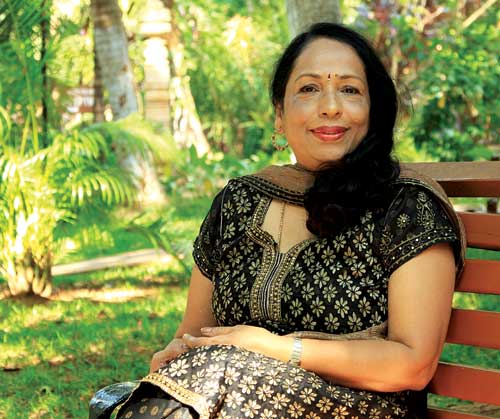Ayurveda for Better Health: Vital Tips from Gita Ramesh
Ayurveda is one of the oldest scientific medical systems in the world with a long record of clinical experience. This traditional science has been handed over through the centuries by ancient physicians, who greatly valued the health and fitness of the human body. This science, true to its name, is well-accepted as a natural and effective way of keeping the body healthy and free of toxins, opines Gita Ramesh – MD, Kairali. Here are pearls of wisdom from her…

Ayurveda as Preventive Theory
‘Ayurveda’ means ‘the science of life’ – ‘Ayu’ means ‘life’ and ‘Veda’ means ‘science’. This traditional science has been working wonders for more than 5000 years and not only heals the body but also the mind and spirit. Hence, it can truly be called Holistic Science. This ancient science of medicine and positive health is still relevant and beneficial to modern life.
The Principles
The common basic idea of medicine and philosophy is that whatever one finds in the universe or cosmos is also found in the human body. Every human being is a unique combination of five elements provided by Mother Nature and these elements are earth, water, fire, air, and space.
According to Ayurveda, there are three primary life forces in the body or three biological humors called Vata, Pita, and Kapha. A perfect balance in these vital forces of life results in the healthy state of the human body, which constitutes of the Mind, Body and Soul.
Ailments, as we say, are a result of the imbalance in these vital forces of life. The primary objective of the Ayurvedic physician is to diagnose and establish the misbalance, which could be the elevation or the depression in these vital forces, and then prescribe and offer treatments to bring the forces back to the balanced levels. Ayurveda’s main objective is emphasising on the preventive aspects.
The Therapies and Programs offered are to strengthen the immune system to achieve good health and longevity, and directed at getting rid of all the toxins.
The Daily Regimens & The Seasonal Ones
According to Ayurveda, the ideal way to maintain health is to follow these four regimens:
- Dinacharya — Day Regimens
- Ratricharya — Night Regimens
- Ritucharya — Seasonal Regimens
- Acharya Rasayan — Mental Regimens
Dinacharya
Sanskrit word for Daily Routine.
A routine practised daily is stronger medicine than an occasional remedy. Our daily activities have a preformed effect on our health. Which are:
Waking Up: Get up between 4 am to 6 am; it is the most peaceful and calm time of the day. Make this an ideal time for spiritual practice or simply take a few deep breaths and adopt an attitude of gratitude for waking up to a new day.
Cleansing the Senses: Splash your face with cool or lukewarm water and massage the eyelids by gently rubbing them. Blink seven times and rotate your eyes in all directions. Gently wash the ears and nose, brush your teeth, and use a tongue cleaner. Finally, gargle with warm water/oil. You could also do this with saltwater or turmeric water to keep your voice, gum, mouth, and throat healthy.
Elimination: Empty your bladder and colon upon rising. Have some warm water to rehydrate the tissues and flush toxins that have accumulated overnight.
Exercise: Regular exercise, especially yoga and breathing exercises, improves circulation, strength and endurance. Early morning exercise removes stagnation in the body and mind, strengthen the digestive fire, reduces fat, and gives you an overall feeling of lightness and joy.
Meditation: It is important to meditate in the morning and evening, for at least 15 minutes. It brings balance and peace to your life and is the most important aspect of Dinacharya. Simply be quiet, sit in peace, and turn your attention to awareness.
Abhyangam: According to Ayurveda Abhyangam is an essential component to Dinacharya. The practise nourishes and strengthens the body, encourages regular sleep patterns, stimulate internal organs, and enhances blood circulation.
- Nasyam: Nose Drops
Before Abhyangam, put 3 to 5 drops of oil in each nostril. This helps to lubricate the nose, cleans sinuses, and improves voice, vision and mental clarity. Our nose is the door to the brain, so nose drops nourish Parna and bring intelligence. - Ear Drops: Put a few drops of oil into your ears. This helps in the removal of excess ear wax, poor hearing etc.
- Self Abhyangam: Gently massage the scalp and rub the oil all over your body for just about 5 to 10 minutes. Massaging the scalp prevents headache, baldness, and grey hairs, while oiling the body keeps your skin soft. This is one of the main ways through which Ayurveda keeps us strong and prevents us from ageing.
Bathing: Bathing is cleansing and refreshing. It removes sweat, dirt and fatigue while bringing energy to the body and clarity to the mind.
Clothing: Should be fresh and clean – this brings in beauty and virtue.
Using of Perfumes: Natural scents, essential oils or perfumes bring freshness, charm, and joy. It gives vitality to the body and improves self-esteem.
Breakfast: This should is substantial, warm, nourishing, and wholesome.
Ratricharya
It is a regime to be followed after sunset, until morning. The night is meant for complete rest as sleep provides all-round improvement of the body organs to allow replenishment and other anabolic activities. An adequate amount of sleep also increases the power to digestion, removes fatigue, and restores natural equilibrium in the functioning of various systems in the body. Sleep is also said to destroy half of our diseases.
The three important aspects of Ratricharya are:
- Ahara (food)
- Shayana (sleep)
- Mithuna (sexual life)
After the days work, one should follow the basic hygiene like washing hands, feet, face, and mouth. The ideal time for the evening meal is between 7-9 pm and it should be had warm. A gentle walk is beautiful after the meal as it is relaxing and tends to make you feel light and mentally relaxed before going to bed.
Dinner should always be light, consisting of easily digestible food in lower quantity, as compared to lunch.
- Excessively oily and spicy foods should be avoided
- Make it a point to have some warm water along with food
- Avoid consuming curd at night
- Sleep: One should always sleep early, at least by 10-10:30 pm. Therefore, if possible fix a regular time for sleep. The bedding should be comfortable.
- Sex: This is a natural instinct and is said to be practised best at night time. These activities when strictly followed will maintain a healthy body and prevent many diseases.
Ritucharya (Seasonal Regimens)
- The prime principle of Ayurveda system of medicine is the preventive aspect that can be achieved by a change in diet and practises in response to the changing climatic conditions. This is an important aspect of preventive medicine.
- Lifestyle disorders are common in the present era, basically originating from lack of seasonal regimens.
- Nowadays, not only are lifestyle disorders becoming more common, but they are also affecting the younger population.
- The strength and complexion of the person following the suitable diet and regime for as per the season, are naturally enhanced.
Achara Rasayana (Mental Regimens)
- Achara Rasayana helps to have good control on the mind.
- In Ayurveda, it is an integral part of preventive medicine.
- This is about the codes of conduct, such as how a person should live and what he should do or should not do.
- The origin of this concept is having a healthy mind on which you have good control.
- Ayurveda equally considers all aspects of life for optimum health.
- These include consideration of physiological, social behaviour, food and diet, and spiritual aspect of life.
Ritu/Six Seasons
Shishira: (Late Winter) Mid-Jan to Mid-March
- During this season, the strength of a person becomes less.
- The environment remains cold.
- Diet Regimens: Foods with a predominant sour taste are preferred. Cereals, pulses, rice, and corn are advised.
- Ginger, garlic, and pepper should be added to the diet.
- Sugarcane products along with milk and milk products are to be included in the diet.
- Massage with oil and the strength of the person improves to a medium degree.
Vasanta: (Spring) Mid-March to Mid-May
This season is considered as flowering seasons.
- The predominant rasa is astringent
- Diet Regimens: One should take easily digestible food.
- Food items tasting bitter, pungent and astringent are to be taken
- Honey is to be included in the diet.
- Foods which are hard to digest should be avoided.
Garishma: (Summer) Mid-May to Mid-July
The environment is prevalent with intense heat and unhealthy wind.
- The strength of a person becomes less.
- Diet regimens: Foods that are easy to digest, with more liquids. Drink plenty of water and other liquids like buttermilk, fruit juices, and light soups.
Varsha: (Monsoon) Mid-July to Mid-September
The predominant rasa during this season is amla (sour).
- Diet Regimens: Food having sour and salty taste are to be taken.
- Boiled herbal water is preferred.
- Meat soups are to be included in the diet.
- This is the season for undergoing Panchkarma.
Sharad: (Autumn) Mid-September to Mid-November
The predominant rasa is salty.
- Diet Regimens: Food that is sweet, bitter and light to digest and having cold properties are advised.
Hemanta: (Early Winter) Mid-November to Mid-January
Predominant rasa during this season is (Madhura) sweet.
- Diet Regimens: Sweet Sour and salty food.


